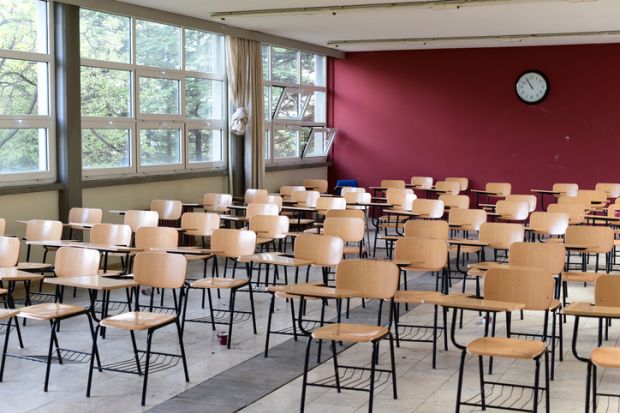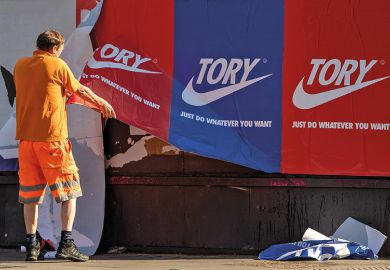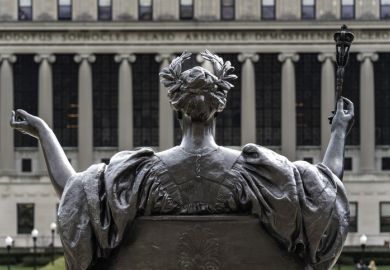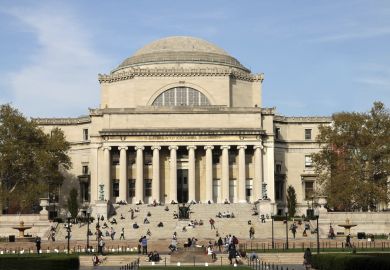Nearly 200 speakers or events were rejected by English universities last year, more than double the figure from the year before, but 99 per cent of requests were approved.
Susan Lapworth, the interim chief executive of the Office for Students, highlighted the rise in rejections and said she would be “concerned” if it indicates that “lawful views are being stifled” and that the regulator would intervene if universities were not meeting their free speech obligations.
Data are collected and published by the OfS as part of its monitoring of universities’ compliance with the government’s Prevent strategy, which aims to stop people becoming involved in terrorism or extremism.
It shows that 19,407 events were held by universities and colleges with external speakers in 2020-21, with 193 speaker requests or events rejected. This is up compared with the 94 rejected in 2019-20 and the 141 in 2018-19. A further 632 events were approved subject to mitigations.
Institutions were asked to clarify whether events were cancelled for Prevent-related reasons or other factors. The most common reason given was “procedural matters”, defined as whether the event adhered to policy and procedures. There were 157 cancellations for this reason, while 29 couldn’t take place because of health and safety concerns.
“This data shows that more than 99 per cent of events and speaker requests were approved in 2020-21 and suggests that – in general – universities and colleges remain places where debate and the sharing of ideas can thrive,” Ms Lapworth said.
“However, it is the case that the number and proportion of rejections sharply increased in 2020-21, with almost 200 speakers or events rejected. We would be concerned if those cases suggest that lawful views are being stifled.”
Freedom of speech on campus was a key issue for Boris Johnson’s Westminster government, although it remains to be seen whether the mantle will be taken up by the outgoing prime minister’s successor.
Legislation that creates a new free speech and academic freedom champion who would sit on the OfS’ board and allows individuals to sue institutions if they feel free speech duties have been breached has progressed to the House of Lords.
Ms Lapworth reminded universities that they are already required to take steps to secure freedom of speech within the law.
“This applies to their arrangements for external speakers and events on which we have reported today, but also to the exchange of ideas in lecture and seminar rooms, and across research communities. Topics which some may find offensive or controversial must be open to free debate in those contexts too,” she added.
“The OfS will continue to regulate universities to ensure they are meeting their obligations for freedom of speech. We are willing to intervene where we have concerns this may not be the case in this fundamentally important area.”
The report also shows that 47 cases were referred by higher education providers to external Prevent agencies in 2020-21. Institutions were asked to identify any underpinning ideology for each case and 15 were identified as potential extreme right-wing radicalisation while 14 were classified as potential Islamist radicalisation.#
Jo Grady, University and College Union general secretary, said: “The Tory narrative of a free speech crisis caused by oversensitive students is totally at odds with the evidence. There are serious threats to free speech and academic freedom on campus, but they come from the rampant use of precarious contracts which deny job security and basic employment rights to staff.”
She added: “Whilst this data shows interference in a concerning number of speaker events and the impact of censorious policies such as Prevent, it doesn’t even begin to capture the extent of the chilling effect caused by a government which repeatedly makes authoritarian interventions in campus life, only last month demanding universities withdraw from an important race equality charter.”
Register to continue
Why register?
- Registration is free and only takes a moment
- Once registered, you can read 3 articles a month
- Sign up for our newsletter
Subscribe
Or subscribe for unlimited access to:
- Unlimited access to news, views, insights & reviews
- Digital editions
- Digital access to THE’s university and college rankings analysis
Already registered or a current subscriber? Login








